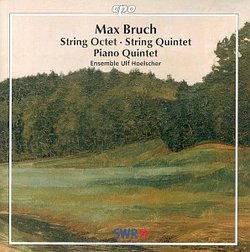| All Artists: Max Bruch Title: Bruch: Piano Quintet/String Quintet/Octet Members Wishing: 0 Total Copies: 0 Label: Cpo Records Release Date: 5/11/1999 Genre: Classical Styles: Chamber Music, Symphonies Number of Discs: 1 SwapaCD Credits: 1 UPC: 761203945122 |
Search - Max Bruch :: Bruch: Piano Quintet/String Quintet/Octet
 | Max Bruch Bruch: Piano Quintet/String Quintet/Octet Genre: Classical
|
Larger Image |
CD DetailsSimilar CDs |
CD ReviewsMUCH TO BABBLE ABOUT THIS BRUCH! Melvyn M. Sobel | Freeport (Long Island), New York | 11/20/2000 (5 out of 5 stars) "Max Bruch (1838-1920), unlike many of his Late Romantic contemporaries, did not compose a thick portfolio of chamber works. But, in the inimitable words of Spencer Tracey, what he did write is "churce." Choice, indeed, and delectable. CPO has given us reason to welcome this CD collection of consistently rewarding, rare and glorious Bruch chamber music--- played and recorded beautifully. Yes, there are echoes of Brahms here, and of Mendelssohn, and of Schumann; but, in all, Bruch has his own "voice," both melodious and gifted. And although he may not reach the summit, nor plumb the depths, you will still find these works bountiful, superbly crafted, engaging and downright memorable. (Sample, for instance, the slow movements--- gorgeous all!) Noteworthy, too, is the fact that two works [Octet and String Quintet] were written at the cusp of Bruch's death at eighty-two! I say noteworthy because these works are incredibly Romantic for the period in which they were composed. Hard to believe. Bruch was his own man, which is wonderful for us. He radiates throughout this music. The Ulf Ensemble has full measure: they delight and please. [Running time: 78:26] " A fine CD of the late works of a neglected composer. Christopher (castellc@carleton.edu) | Northfield, Minnesota | 10/29/1999 (5 out of 5 stars) "It has become a standard cliche among critics that much of Max Bruch's output has been neglected due to the popularity of his first Violin Concerto. What tends not to be emphasised is that many of Bruch's lesser-known compositions are also fine examples of late Romanticism. It goes without saying that this recording can be heartily recommended to all fans of the chamber music of Mendelssohn, Schumann, Brahms, and Dvorak. Well-done interpretations of some delightful works by a composer who deserves to be heard more often." Some Rare Music of Beauty M. C. Passarella | Lawrenceville, GA | 07/11/2008 (5 out of 5 stars) "This disc surveys a fair percentage of Max Bruch's chamber music output. Unlike piano music, Bruch seems to have had no antipathy to chamber music (though understandably, the piano rarely features in his chamber works). Even so, he produced little over the course of his long life. As a child, he wrote a strikingly precocious septet, and while a student of Ferdinand Hiller produced a series of piano trios and a bit later, string quartets. He then turned his attention to opera, orchestral music, and choral music, where he found his true calling. At least, he was encouraged by his contemporaries to think so. Today, of course, Bruch is best known for his orchestral music with violin. His choral music is slowly being rediscovered, but his chamber music is virtually unperformed, and recordings of this music rarely hang around long in the catalogue.
Kudos, then, to CPO for bringing us the current selection of works from the middle and end of Bruch's creative life. The Piano Quintet is a curious affair. Written at the request of English musical amateurs, the work was begun while Bruch served as conductor of the Liverpool Philharmonic (1880-83) and was finally completed after he returned to Germany. It is dramatic, almost stormy, despite the fact that it predictably makes no great demands on the performers. Still, amateurs would have to be both competent and confident to bring off the fleet third movement scherzo. The other works have greater substance. The Octet of 1920, the last year of Bruch's life, starts with a radiant sonata allegro based on two lovely, typically Bruchian themes. The slow movement has the tinge of melancholy that flavors many of the composer's slow movements, while the finale is a buoyant piece that sails confidently along. It sounds a lot like the last movement of Bruch's Third Symphony, penned about thirty-five years earlier, and represents not a minute's worth of advance in Bruch's musical thinking over all those years. The same is true of the String Quintet, one of two such works from 1919. It could just as easily have been penned in the 1880s. Here, the slow movement, based on a movement from Bruch's 1912 Serenade for string orchestra, is the emtional heart of the work. Bruch successfully expands his earlier effort into a movement of tender beauty. All these works are deserving of live performance, especially the robust and youthful-sounding Octet. But besides the conservatism of Bruch's idiom, another issue that has probably kept performers at arm's length from the two pieces for strings is the fact that the first violinist has the lion's share of work to do, and no ordinary violinist need apply for this job. Fortunately, CPO offered the job to violin virtuoso Ulf Hoelscher and his ensemble. With Hoerlscher, who's had a distinguished solo career, at the helm, Bruch's music gets the kind of performance it deserves. There is much lovely music here, beautifully played and recorded. If you need to, just pretend the two late works were written when Arnold Schoenberg was still in knee pants, and enjoy. Enjoy. " |

 Track Listings (11) - Disc #1
Track Listings (11) - Disc #1